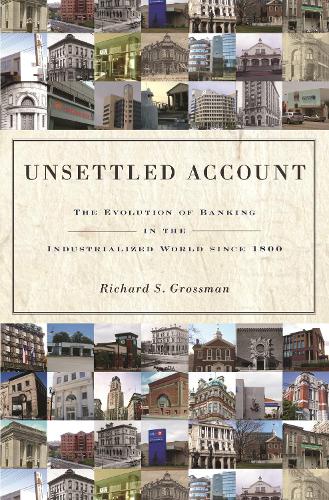
Unsettled Account: The Evolution of Banking in the Industrialized World since 1800
(Paperback)
Available Formats
Publishing Details
Unsettled Account: The Evolution of Banking in the Industrialized World since 1800
By (Author) Richard S. Grossman
Princeton University Press
Princeton University Press
4th August 2020
United States
Classifications
Tertiary Education
Non Fiction
Banking
Economic theory and philosophy
332.109
Physical Properties
Paperback
408
Width 156mm, Height 225mm
Description
Commercial banks are among the oldest and most familiar financial institutions. When they work well, we hardly notice; when they do not, we rail against them. What are the historical forces that have shaped the modern banking system In Unsettled Account, Richard Grossman takes the first truly comparative look at the development of commercial banki
Reviews
"Grossman's is a good read. The book tells you as to how we got to be where we are. There are lessons to be learnt for those who want to go about reshaping reforms in global banking." * BusinessWorld *
"Grossman weaves an enormous amount of research into an impressive history of the banking industry in many developed countries over the last 200 years. His focuses primarily on changes in the size and structure of the banking industry over time and argues that banks and bank assets rise as a share of overall economic output and then fall as a country moves from developing to developed. . . . [T]his work represents a valuable contribution to the history of banking." * Choice *
"Professor Grossman has assembled an impressive collection of historical, statistical, and bibliographic data, one that would be extremely difficult to reproduce using other sources. This information will prove invaluable for those conducting intensive research on commercial or international banking, and Unsettled Account will make an excellent addition for libraries that commonly serve such patrons. Academic law libraries at institutions offering specific courses in commercial banking may also want to consider a copy."---Shannon L. Kemen, Law Library Journal
"Unsettled Account provides us with a new and welcome history of the last three centuries of banking. Who should read this book A lot of people. For the legions of political, social and cultural historians, if they have to read one book on the historical evolution of banking, this is it. It will provide them with the needed theoretical background without an equation in sight, useful country studies, and the insights needed to instruct their students. For the legions of economic theorists, if they have to read one book on the historical evolution of banking, this is it. The book is a guide to every key stylized fact they might use for a model, identifying the broad parameters of institutions and history. For the legions of policy makers, if they have to read one book on the historical evolution of banking, this is it. Distanced from the crisis of the moment, Grossman nicely hits the key issues and distills some relevant lessons."---Eugene White, EH.Net
"[A] number of books stand out as works of real scholarship written by experts in their fields. Unsettled Account should be numbered among the best of those produced so far."---Ranald Michie, BHR
"Richard Grossman has produced a valuable and accessible synthesis of research on some key aspects of banking history in this publication. . . . Students and academics with an interest in financial history, as well as practitioners and regulators, would benefit from reading Unsettled Account."---John Singleton, Australian Economic History Review
"Richard Grossman has long been a well regarded figure in the field of financial history, and he has applied his knowledge and analysis to produce a comparative history of banking in Western Europe, North America, Australia, and Japan over the course of the nineteenth and twentieth centuries."---Ranald Michie, Business History Review
"What Grossman has done, in drawing our attention to the way in which past banking crises have been dealt with, is a significant contribution to the literature on the problems and difficulties involved in dealing with banks."---Jonathan Warner, European Legacy
Author Bio
Richard S. Grossman is professor of economics at Wesleyan University and a visiting scholar at the Institute for Quantitative Social Science at Harvard University.
